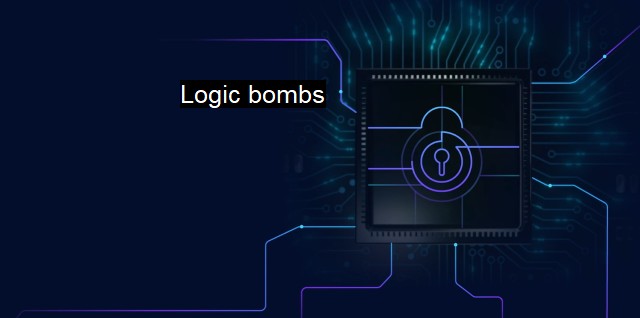What are Logic bombs?
The Threat of Logic Bombs: Exploring Their Impact on Cybersecurity in the Digital Age
A logic bomb is akin to a sleeper agent in the vast world of cyber warfare. Existing subtly within a system, it waits patiently to strike, not as a continuous threat but as a conditional one. A primarily malicious code, it is aptly named after its destructive tendencies, detonating in response to adefined trigger. Cybersecurity fights a relentless war against these silent assailants, using antivirus strategies as armor.Quite like a rogue trait within an organism, logic bombs plant their roots deep within innocuous-looking software or applications and lie dormant until specific conditions are met. Triggered by a variety of events, it could be something as ordinary as launching a program, or something specific like the passage of a certain duration of time. These triggers ensure that the malicious intent of the logic bomb remains veiled until it's too late.
Wreaking massive damage on an unsuspected host system is the standard modus operandi of a logic bomb. Available in different packages, the aftermath of detonations ranges from intrusive annoyances to downright disastrous. The possible outcomes involve anything, from relentless display of pop-up windows spoiling user experience, to deleting crucial data files which could result in large-scale system malfunctions.
The IT sector, renowned for its heavy reliance on digital infrastructure, runs a particularly high risk of being sabotaged by logic bombs. Deliberate employment of such destructive tactics by unethical insiders is not uncommon. Disgruntled employees, blackmail, corporate rivalry, or straightforward sabotage - logic bombs present an unarguably attractive weapon owing to their capacity for damage coupled with the untraceability.
Naturally, countering these digital threats calls for robust cyber protection gear. This is where the role of antivirus software comes in. Their ability to safeguard digital real estate largely stems from their prowess to scan and identify uncharacteristic patterns and anomalous behaviors. Even though logic bombs are dormant by nature, their singularity lies in the chosen trigger mechanism, an anomaly which is identified, isolated, and neutralized by the proactive surveillance and protective interventions typical of antivirus software.
Let's now consider the preventive antidotes to logic bombs. Cyber hygiene is pivotal in ensuring that the systems are less susceptible to such attacks. Regular software updates and using strong, randomized passwords can reduce exposure and vulnerability. Employing high-quality antivirus software, which possesses top-notch scanning mechanisms and updated threat recognition, further strengthens the fort.
Clean coding is another buzz phrase linked closely with logic bombs. It indicates a practice of maintaining a refined, clutter-free code without any hidden, unnecessary compilations susceptible to malicious infiltration. Code reviews are useful in this context, identifying any malicious insertions early on and ensuring a clean and healthy functioning for the application.
Given the unrelenting advancement and the ever-adapting nature of cyber threats, the evolution of defense strategies needs to be unfortunately faster. Dynamic cybersecurity infrastructures carry the potential to revolutionize protection against logic bombs and the likes, initiating a paradigm shift from detection to prediction.
Logic bombs, owing to their conditional and clandestine design, pose significant cybersecurity threats. Employing them as weapons in cyber warfare, attackers have found ways to infiltrate systems subtly and cause extensive damage before being detected. the shield of advanced antivirus protection mechanisms and other preventive measures offer much-needed solace. While the cybersecurity landscape braces itself for newer, unprecedented attacks, it remains industriously hopeful and prepared.

Logic bombs FAQs
What is a logic bomb?
A logic bomb is a piece of malicious code that is inserted into a program or system with the intention of causing harm. It is designed to execute a specific action when certain conditions are met, such as a specific date or time.How do logic bombs work?
Logic bombs work by lying dormant within a system until certain conditions are met. Once those conditions are met, the logic bomb will activate and cause harm, such as deleting files or corrupting data.How can I protect my system from logic bombs?
The best way to protect your system from logic bombs is to install antivirus software and keep it up-to-date. Additionally, you should only install software from trusted sources and avoid clicking on suspicious links or attachments in emails. It is also a good idea to regularly back up your important data.What should I do if I suspect a logic bomb in my system?
If you suspect a logic bomb in your system, you should immediately disconnect from the internet and shut down your computer. Contact a cybersecurity professional for assistance in removing the logic bomb and restoring your system to its normal state.| | A | | | B | | | C | | | D | | | E | | | F | | | G | | | H | | | I | | | J | | | K | | | L | | | M | |
| | N | | | O | | | P | | | Q | | | R | | | S | | | T | | | U | | | V | | | W | | | X | | | Y | | | Z | |
| | 1 | | | 2 | | | 3 | | | 4 | | | 7 | | | 8 | | |||||||